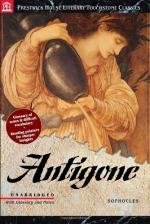|
This section contains 1,307 words (approx. 5 pages at 300 words per page) |

|
Moral Conflict in "Antigone
Summary: In the ancient Greek play "Antigone," Sophocles presents a theme of moral conflict. Antigone and Ismene must choose between the city's law and the god's law in deciding to bury Ismene's dead and disgraced brother, Polyneices.
The major moral conflict in Antigone by Sophocles is the conflict over which value is most fundamental. The play presents the moral conflict over whether the god's law or the city's law is more powerful. This seems to be the most prominent theme. The conflict arises mainly between the tragic heroes Antigone and her uncle-in-law Creon, King of Thebes. The city of Thebes had been through a war in which Antigone and her sister Ismene have lost both of their brothers to it, Eteocles and Polyneices. Eteocles's fighting for Thebes was buried and honored as a hero. (lines 24-26) Polyneices was left unburied and dishonored because he is considered an enemy of the city. (lines 27-32) Creon edicts that whoever broke the law by burying Polyneices will be considered a criminal. (lines 203-209)
The conflict between Antigone and Creon arises when she decides she must honor her brother's...
|
This section contains 1,307 words (approx. 5 pages at 300 words per page) |

|


